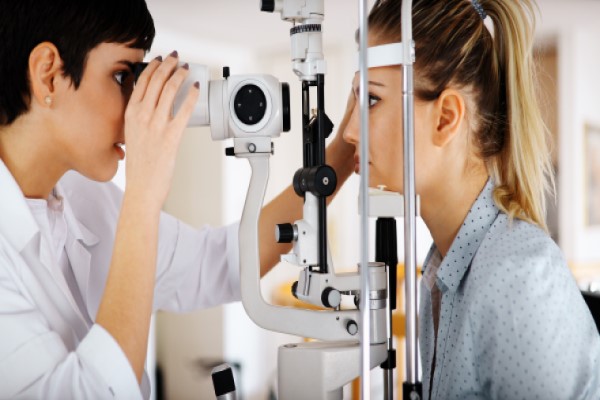7 Reasons To Go to the Eye Doctor

Wondering whether you need to go see an eye doctor? Read on for some common reasons to visit an eye doctor. Undergoing regular eye exams from an eye doctor is a good idea, especially if you already wear contacts or glasses. Getting a new prescription may be an annual errand, or maybe you only go when there seems to be a noticeable change in your vision or eyes. Perhaps your night vision is getting dimmer or watching TV through squinted eyes is the new norm. There may be other times a call to the eye doctor is a good idea. Continue reading to learn more.
7 Reasons to visit an eye doctor
The eyes are the windows to the world, and as such, maintaining proper eye health is essential. With the increase in computer and smartphone usage, more people may experience consistent eye discomfort. Annual eye exams are a necessary element of overall body health. During yearly checkups, doctors not only check for vision changes but a variety of serious conditions, such as glaucoma, cataracts, and cancer. If any of these conditions get discovered, the eye doctor may recommend more frequent appointments.
Even if an annual schedule is maintained, there are times in between when seeing an eye doctor is necessary. A minor symptom may signal ensuing problems that need addressing.
1. Frequent headaches
Headaches may be part of one's norm; however, when the pain is unrelenting or persistent, it may be time to visit the eye doctor. A headache may be a sign that the eyes are straining due to overuse. However, such pain may also mean that there has been a development such as astigmatism, a condition in which the lens of the eyes is no longer curved properly, causing blurry vision.
2. Bright flashes
Occasionally lines may appear to pass by the lens of the eye. These floaters are common, but if there is an increase in sightings or inexplicable bright flashes of light, call the eye doctor. These are signs that the retina may have become detached. If ignored, it could lead to blindness.
3. Pain in the eyes
Pain in the eyes is different from a headache. Sharp, stabbing, or dull and aching, this pain can present in many different ways. While some degree of pain may be normal from time to time, an escalation could be a symptom of a serious problem with the cornea or there may be a scratch on the surface.
4. Diabetes
Diabetes is a health condition that may also be detrimental to the eyes. If there is a family history of diabetes, it is crucial to maintain regular visits with an eye doctor. Failing to do so may lead to blindness.
5. Get eyesight correction
Correcting eyesight is the most common reason to see an eye doctor. A proper examination is necessary for those who have not undergone an eye test in a while. In most cases, people visit the eye doctor in response to a problem; eye strain, night blindness, red eyes, blurriness, and even persistent headaches are all signs that an appointment with the doctor is necessary. Even if no issue is present, it is advisable to still go for the eye test. The impact of the smallest amount of vision correction can be incredible.
6. Update prescription
Prescription eyewear users should get their vision checked annually to make sure they are wearing the proper corrective lenses. However, despite that wearing an improper prescription is not harmful to one's health, it might cause nausea and headaches if they are too strong.
Children's eyes are still growing, so prescriptions that are either under or over-prescribed might affect their vision. A child's ability to study well at school depends on their ability to see clearly over a typical school day.
7. Check for symptoms of health conditions
The eyes can sometimes reveal certain health issues. A yellow tinge to the whites of the eyes might indicate hepatitis or liver disease. Irregular pupils and little bleeding on the surface of the eye might indicate that the patient is having a stroke or a brain tumor. A careful examination of the eyelids might reveal signs of skin cancer.
Ready to schedule an appointment?
Visiting an eye doctor regularly should remain a priority, but a special appointment may be in order if there is a significant change in signs or symptoms. Aside from monitoring vision, an eye doctor may help diagnose and save the eyes from a disease or disorder.
Get more information here: https://www.texasoptical.net or call Texas Optical at (214) 771-7333
Check out what others are saying about our services on Yelp: Read our Yelp reviews.
Recent Posts
The selection of eyewear feels significantly easier when the styles and craftsmanship of Versace eyewear enters the conversation, since bold lines and iconic detailing create an instantly recognizable look. Versace represents the intersection of Italian fashion and Greek mythos, blending confident glamour with symbolism through its signature Medusa logo. The brand is widely associated with…
Many people who work in construction or laboratories wear safety glasses to protect their eyes during the day. However, keeping your eyes safe extends beyond hazards in the workplace. There is a wide variety of household chores and hobbies for which you should wear eye protection. When used consistently, safety glasses help create a safer…
Transitions lenses combine style and convenience to support clear vision without switching between regular glasses and sunglasses. While they were often considered unfashionable in days past, times have certainly changed. Today, transition lenses can be fashionable, chic, and a reflection of your personal style. When designing a pair for you, an optometrist will look at…
Dry eye treatment is important when occasional irritation becomes ongoing discomfort that interferes with daily activities. Many individuals experience dryness, burning, or a gritty feeling in the eyes from time to time. However, when symptoms start to affect reading, screen use, or time outdoors, a structured approach to diagnosis and care helps protect comfort and…


